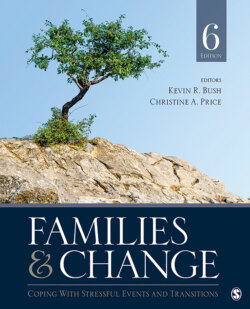Читать книгу Families & Change - Группа авторов - Страница 34
На сайте Литреса книга снята с продажи.
Enduring Vulnerabilities
ОглавлениеIndividual differences or enduring vulnerabilities in personality and emotional functioning can both contribute to everyday hassles and affect how family members adapt to them. For example, enduring vulnerabilities play an important role in determining how family members process, interpret, and react to the everyday hassles they encounter. In addition, the extent to which individuals possess relatively stable traits can render them resilient or vulnerable to the transfer of stress from everyday hassles. For example, studies have found exaggerated stress responses to hassles among individuals with higher levels of negative affectivity, neuroticism, type A personality traits, depression, and introversion (e.g., Almeida, McGonagle, Cate, Kessler, & Wethington, 2002; Falconier et al., 2014) and lower levels of mastery and self-esteem (Almeida, McGonagle et al., 2002; Pearlin, 1999).
Gender differences may influence the extent to which enduring vulnerabilities moderate the links between daily hassles and family stress may differ for men and women. Almeida, McGonagle et al. (2002) asked 166 married couples to complete daily diaries for 42 consecutive days. In each diary entry, participants responded to a short questionnaire about a variety of daily stressors, including arguments with their spouse, as well as a questionnaire designed to assess psychological distress. The analyses addressed the moderating effects of psychological characteristics (i.e., neuroticism, mastery, self-esteem, and extraversion) on the link between marital arguments and psychological distress. They found that the extent to which wives felt distressed following marital arguments was exacerbated by high levels of neuroticism and attenuated by high levels of mastery, self-esteem, and extraversion. In contrast, self-esteem alone moderated the link between marital arguments and psychological distress for husbands. Almeida, McGonagle et al. (2002) suggested that because personality has been shown to be particularly salient for coping with stressors that are highly threatening or uncontrollable, the different patterns that emerged for husbands and wives in their sample imply that wives may perceive marital arguments as more threatening than do husbands.
